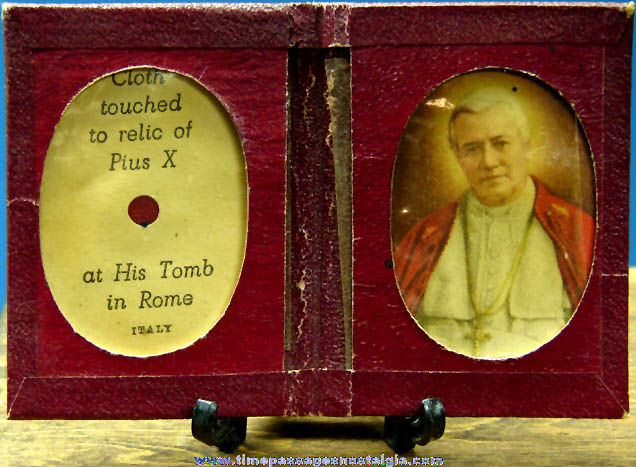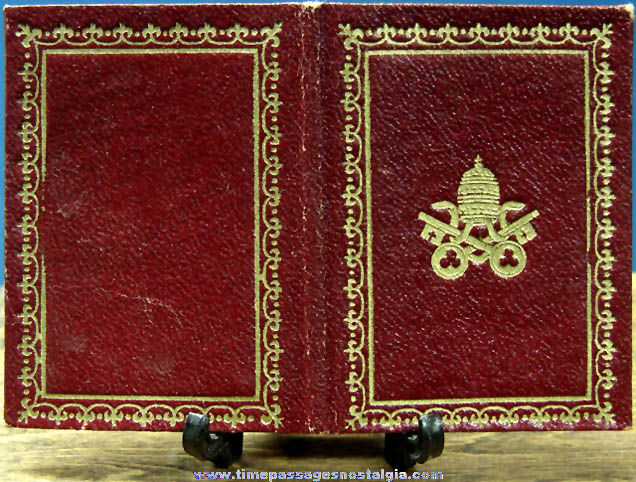
   | | Any group of items being offered as a lot must be sold as a lot. | | | All Original Items.
No Reproductions | You don't have to be an eight year old to enjoy having
a childhood treasure. | Great memories
make great gifts! | Nostalgic Memorabilia, Pop Culture Artifacts, Historic Items,
and "Shoe Box Toys" | Don't forget to
bookmark this site. |  | | Unique & Fun Nostalgic Items | | An Ever Changing Inventory |
| | | | The picture shows a front and back view of this Old Pope Pius X Religious Relic Card with Picture & Holder. The year that this relic was made is unknown but it is old. It is from Rome, Italy. The holder is maroon with gold embossing. There is a colorful picture of Pope Pius X on one side and a red fragment of cloth that is sealed in the card on the left. Both sides have a clear covering over them. The card is marked as follows: CLOTH TOUCHED TO RELIC OF PIUS X
AT HIS TOMB IN ROME
ITALY To judge the sizes, the opened holder measures 3-5/16'' x 2-1/4''. It is in excellent or better condition as pictured. Below here, for reference, is some information found on Pope Pius X: Pope Pius X
From Wikipedia, the free encyclopedia Saint Pius X Papacy began: August 4, 1903
Papacy ended: August 20, 1914
Predecessor: Leo XIII
Successor: Benedict XV
Birth name: Giuseppe Melchiorre Sarto
Born: June 2, 1835 in Riese, Italy
Died: August 20, 1914 (agedÊ79) in Apostolic Palace, Rome, Italy Saint Pius X (Latin: Pius PP. X) (June 2, 1835 - August 20, 1914), born Giuseppe Melchiorre Sarto, was the 257th Pope of the Roman Catholic Church, serving from 1903 to 1914, succeeding Pope Leo XIII (1878 - 1903). He was the first pope since Pope Pius V (1566 - 1572) to be canonized. Pius X codified Catholic doctrines to inspire conformity in the church and rejected modern values. His most important reform codified Church law in a central fashion. He was a pastoral pope, encouraging personal piety and a life style reflecting Christian values. He was born in the pastoral town of Riese . Pope Pius was a Marian Pope, whose encyclical Ad Diem Illum expresses his desire through Mary to renew all things in Christ, which he had defined as his motto in his first encyclical. Pius believed that there is no surer or more direct road than by Mary to achieve this goal. Pius X was the only Pope in the 20th century with extensive pastoral experience at the parish level, and pastoral concerns permeated his papacy; he favoured the use of the vernacular in catechesis. Frequent communion was a lasting innovation of his papacy. Pius X had similar problems as did Pope Pius IX, in that he is not considered to have been a great diplomat. His direct style and condemnations did not gain him much support in the aristocratic societies of pre-World War I in Europe.
His immediate predecessor had actively promoted a synthesis between the Catholic Church and secular culture; faith and science; and divine revelation and reason. Pius X defended the Catholic faith against popular 19th century views such as indifferentism and relativism which his predecessors had warned against as well. He followed the example of Leo XIII by promoting Thomas Aquinas and Thomism as the only theology to be taught in Catholic institutions. Pius opposed modernism, a theological school of thought, which claimed that Catholic dogma itself should be modernized and blended with nineenth century philosophies. He viewed modernism as a import of secular errors affecting three areas of Roman Catholic belief: theology, philosophy and dogma.Personally, Pius combined within himself a strong sense of compassion, benevolence, poverty, but also stubbornness, and a certain stiffness. He wanted to be pastor and was the only pope in the 20th century who gave Sunday sermons every week. His charity was extraordinary, filling the Vatican with refugees from the 1908 Messina quake, long before the Italian government began to act on its own. He rejected any kind of favours for his family, his brother remained a postal clerk, his favorite nephew stayed on as village priest, and his three sisters lived together close to poverty in Rome. He often referred to his own humble origins, taking up the causes of poor people. I was born poor, I have lived poor, and I wish to die poor. Considered a holy person by many , public veneration of Pope Pius began soon after his death. Numerous petitions resulted in an early process of beatification. |
|
Click on image to zoom.
  |